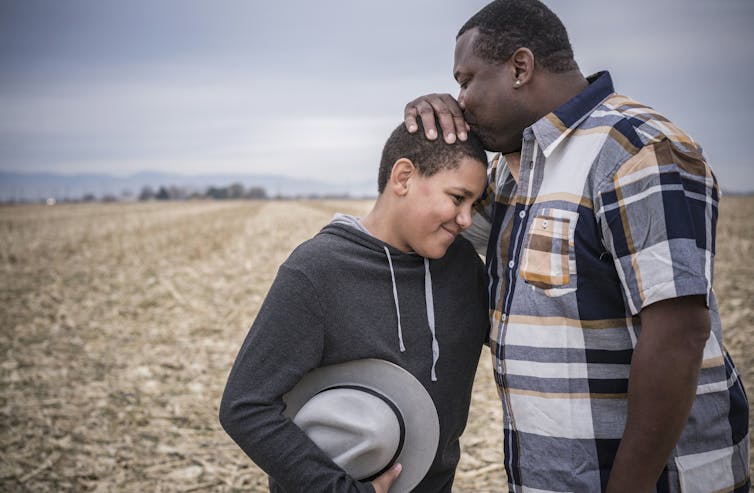Better sleep for kids starts with better sleep for parents – especially after holiday disruptions to
Sound sleep, for long enough every night, with consistent bed and wake-up times are critical for kids’ health. A child development expert suggests some overarching tips to help get you there.

Everyone knows that sleep is critical for growing children and their mental and physical health. Regular, high-quality sleep habits help children consolidate memory and learn better. A lack of sleep contributes to childhood depression, anxiety and even risk of suicide, along with physical health problems, including risk of injury. The challenge is making sure kids log those valuable zzz’s.
There are three main components of high-quality sleep for children. First, they need enough total hours – sleep duration. Sleep quality is important, too – sleeping soundly during the night with few disruptions or awakenings. And, finally, there’s sleep timing – essentially, a consistent schedule, with bedtime and risetime about the same across the whole week.
Even when you know how important good sleep is, it’s easy for sleep duration, quality and timing to get knocked off track. It can happen for infrequent reasons, such as the pleasant chaos of a holiday, or the disturbances that accompany pandemic life. Healthy sleep habits are hard to maintain for everyday mundane reasons, too, such as parent-child disagreement, busy schedules and older children’s leisurely weekend behavior. But there are ways for families to get sleep back on course.
As a child development researcher and family therapist, I study parenting and family behaviors that create healthy environments for children’s sleep patterns. In particular, I help parents to develop consistent and nurturing routines. Sleep patterns are set early, and parents play an important role in nurturing children’s perspectives and attitudes. Here’s the overarching advice I share with families, no matter the age of their kids.

1. Set and model family values about sleep
Children are observant learners. They pay very careful attention to both the spoken and unspoken rules of their clan.
To get everyone in the household sleeping well, sleep can’t be something that only children must care about, while adults who have freedom and power joke about their own unhealthy habits. If sleep seems like punishment, rather than the gift for health that it is, children will be likely to resist it.
Adults need to talk the talk and walk the walk that sleep is a priority for everyone in the family. Be a role model. If you’ve fallen into a habit of binge-watching TV into the wee hours, for instance, work on reining that in. Use positive language about your own sleep. Pay attention to what you say, and what you communicate through your own habits, reinforcing that it’s important to the whole family to get sleep and have energy for the next day. Don’t make the mistake of discussing bedtime as a chance for adults to get distance from the kids.
2. Know your child
Remember, every kid is unique, so don’t expect one-size-fits-all sleep advice to work universally. A child’s temperament plays a significant role in the duration, quality and timing of their sleep. For instance, a feistier child may not adapt as quickly to a sleep schedule over the first year. And temperament is a pretty stable part of who your child is and will continue to be.
A parent’s job is to keep encouraging routines and setting limits – but with ongoing warmth and sensitivity about the characteristics of the one-of-a-kind child you have.
When you’re exhausted and struggling with a child’s behavior, it can be hard to stay positive. My recommendation is to use the daytime hours wisely as investment in your relationship. Be proactive about noticing the good in your kid. Remind yourself that your child is their own person, learning in lots of ways throughout the day, and that child development is a marathon, not a sprint, for positive change. Sleep regressions or other sleep difficulties, like night awakening or changes in sleep habits, are opportunities for growth, not punishment.
By laying this groundwork, it becomes easier to tap into a positive and respectful attitude during times of stress. Remind yourself that change over time is more important than control over a given moment. After all, strained parent-child relationships can actually lead to continuing sleep and behavioral problems in young children.

3. Aim for consistency, with some flexibility
In my practice, I see two common – but opposite – mistakes that parents make around sleep.
First, many parents let go of rules and boundaries altogether. Often this happens as a result of what children bring to the equation: personal temperament or age-related phenomena. For instance, the peak in behavioral aggression that can come in toddlerhood or the shift in sleep timing that comes in adolescence can cause some parents to just throw in the towel and give up.
Alternatively, other parents become rigid. They see conflict around sleep as a struggle for power that the adult must win.
I argue that balance is key. Parents should adopt a consistent approach that fits with the sleep values they’ve been clear about all along. But they must also remain flexible to help children adapt routines to their own unique needs.
For example, all children at all ages should have a regular bedtime and risetime. However, parents may be open to a collaborative plan with older children about what those times should be, or attending to patterns and cues from younger children, working on a reasonable compromise that takes into account the needs of the individual child. Parents’ message about the importance of sleep should never waiver.
4. Manage household issues that influence sleep

Research shows that certain problems outside the bedroom create immediate and long-term risk for children’s sleep quality. These include exposure to second-hand smoke, excessive or evening-timed blue light exposure from screens and conflict in the home. Dealing with these factors will likely pay dividends when it comes to your kids getting a good night’s sleep.
Good sleep hygiene is a family affair. It’s never too late to nudge habits in a good direction and recommit to everyone getting the rest they need. Your child’s sleep habits can be a critical building block of lifelong wellness.
Erika Bocknek does not work for, consult, own shares in or receive funding from any company or organization that would benefit from this article, and has disclosed no relevant affiliations beyond their academic appointment.
Read These Next
Tiny recording backpacks reveal bats’ surprising hunting strategy
By listening in on their nightly hunts, scientists discovered that small, fringe-lipped bats are unexpectedly…
Bad Bunny says reggaeton is Puerto Rican, but it was born in Panama
Emerging from a swirl of sonic influences, reggaeton began as Panamanian protest music long before Puerto…
There aren’t enough geriatricians – here’s how older adults can still get the right care
A few simple strategies can help older adults convey their needs to their health care provider.






